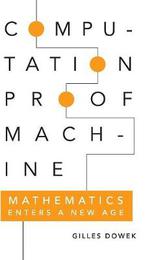
|
Computation, Proof, Machine: Mathematics Enters a New Age
Hardback
Main Details
Description
Computation is revolutionizing our world, even the inner world of the 'pure' mathematician. Mathematical methods - especially the notion of proof - that have their roots in classical antiquity have seen a radical transformation since the 1970s, as successive advances have challenged the priority of reason over computation. Like many revolutions, this one comes from within. Computation, calculation, algorithms - all have played an important role in mathematical progress from the beginning - but behind the scenes, their contribution was obscured in the enduring mathematical literature. To understand the future of mathematics, this fascinating book returns to its past, tracing the hidden history that follows the thread of computation. Along the way it invites us to reconsider the dialog between mathematics and the natural sciences, as well as the relationship between mathematics and computer science. It also sheds new light on philosophical concepts, such as the notions of analytic and synthetic judgment. Finally, it brings us to the brink of the new age, in which machine intelligence offers new ways of solving mathematical problems previously inaccessible. This book is the 2007 winner of the Grand Prix de Philosophie de l'Academie Francaise.
Author Biography
Gilles Dowek is a mathematician, logician and computer scientist, and currently a researcher at the French Institute for Research in Computer Science and Automation (INRIA). He is a member of the scientific board of the Societe informatique de France and of CERNA. He is also a consultant with the National Institute of Aerospace, a NASA-affiliated laboratory. He is the recipient of the French Mathematical Society's Grand Prix d'Alembert des Lyceens for his popular science work. Pierre Guillot is a lecturer in Mathematics at the University of Strasbourg's Institute of Advanced Mathematical Research (IRMA). Marion Roman is a France-based translator.
Reviews'In this pithy, award-winning account of the growing role of computation in mathematics, Gilles Dowek adds further evidence, if any were needed, that the Age of the Algorithm is upon us. A master storyteller, the author takes the reader on an exhilarating journey through the history of mathematics, as he explains, in engaging, vivid prose, why to prove is to compute. A delightful read brimming with big ideas.' Bernard Chazelle, Princeton University 'An engaging study of the history of computing told from a distinctive perspective. Gilles Dowek examines the traditional axiomatic conception of mathematical proof and argues that the advent of computer-assisted proofs (for example the Appel-Haken proof of the four color theorem, the proof of Hale's theorem) and the recent development of the proofs-as-programs idea together lead the way to a new conception of proof, one in which computation rather than logical reasoning plays the dominant role. The result is an illuminating challenge to one of the firmest orthodoxies in the foundations of mathematics.' Michael Detlefsen, University of Notre Dame 'Dowek's book is a superb overview of the transformation of mathematics toward becoming a computational science. It is historically rich, philosophically inquisitive and mathematically rigorous.' Andrew Arana, Metascience
|